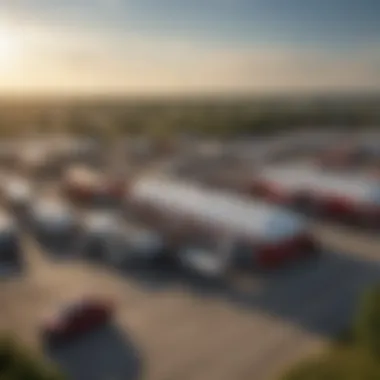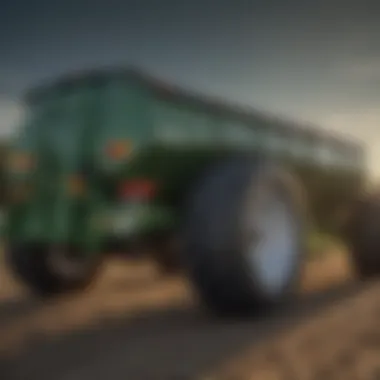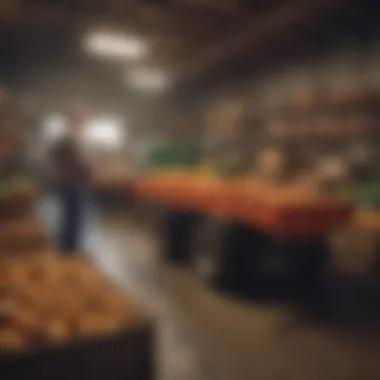Hale Trailer in Baltimore: An In-Depth Exploration


Intro
Hale Trailer is a key player in the transportation industry in Baltimore. It offers a wide range of trailers that are essential for various sectors, notably agriculture. The company’s operational significance extends far beyond just the physical trailers; it reflects the evolving needs of logistics in today’s economy. Understanding Hale Trailer’s offerings and market positioning is crucial for industry stakeholders and agricultural professionals alike.
This article provides a detailed examination of Hale Trailer's impact in Baltimore. By exploring its diverse range of trailers and services, the article highlights how these contribute to enhancing efficiency in local agricultural logistics. With a focus on current trends and practices, it aims to be a resource for those looking to optimize their logistics and supply chains.
Prelims to Hale Trailer
The introduction of Hale Trailer into the transportation sector in Baltimore highlights its pivotal role in shaping local logistics, particularly within the agricultural domain. This section will provide insights into the operational framework of the company and the historical context that has driven its growth in this region. Understanding Hale Trailer is essential for comprehending the contours of trailer offerings and their relevance to the agricultural industry.
Company Overview
Hale Trailer has established itself as a notable player in the trailer rental and sales market. Founded on the principle of meeting the varied needs of customers, the company provides a selection of trailers suitable for multiple purposes. The primary focus is on durability and functionality.
Hale Trailer’s product lines include but are not limited to flatbed trailers, reefer trailers, and lowboy trailers. These products are designed with attention to industry standards, ensuring that they can withstand the rigors of daily use. The company prides itself on creating strong relationships with its clientele, which includes businesses from different sectors, particularly agriculture. As the demand for efficient and reliable transportation solutions increases, Hale Trailer continues to adapt its offerings to meet these changing needs.
History and Growth in Baltimore
Hale Trailer’s journey in Baltimore is marked by significant milestones that underscore its growth within the region. Initially founded to address local transportation demands, the company's evolution reflects the broader trends in the industry. Over the years, Hale Trailer has not only expanded its product range but has also increased its footprint within the market.
The local demand for transportation solutions, especially in the agricultural sector, has encouraged Hale Trailer to grow in response to these needs. The relationships forged with local businesses have facilitated notable partnerships that enhance logistics efficiency. Additionally, the proximity to major transportation routes has further entrenched the company’s position.
As Baltimore has developed, so too has Hale Trailer, consistently adjusting to the challenges and opportunities presented by the evolving transportation landscape.
Product Offerings
Understanding the product offerings of Hale Trailer is crucial to comprehending its impact within Baltimore's transportation landscape. This section outlines the various trailer types available and the customization options that enhance functionality for clients, especially in agriculture. Each type serves specific needs, and customization allows for better alignment with operational requirements.
Types of Trailers Available
Flatbed Trailers
Flatbed trailers are widely recognized for their versatility. They come without sides or a roof, which allows easy loading and unloading of various goods. This characteristic makes them a helpful choice for transporting oversized or heavy cargo. The open design is particularly beneficial for agricultural products that might require direct access during loading processes.
One key feature of flatbed trailers is their adaptability. They can carry machinery, building materials, and food products with ease. However, being exposed can present risks, such as damage from weather. It’s a trade-off that users must think about when choosing flatbed trailers for long-distance transport.
Reefer Trailers
Reefer trailers are essential for transporting perishable goods. These trailers are equipped with refrigeration units that maintain a controlled temperature. This capability makes them vital for businesses that need to transport food or other temperature-sensitive items.
The primary characteristic of reefer trailers is their insulation and cooling system. This design allows for reliable storage of perishable goods over long distances. While they are advantageous for keeping products fresh, reefer trailers can be more costly to operate due to the energy required for refrigeration. This aspect is crucial for business calculations, especially in agricultural markets.
Lowboy Trailers
Lowboy trailers are specifically designed for transporting heavy equipment and machinery. The low profile helps in reducing the center of gravity, making them stable during transit. These trailers are especially well-suited for hauling heavy agricultural tools, such as tractors.
A significant feature is the ramp mechanism that allows for easy loading and unloading of heavy items. While they excel in transporting heavy loads, lowboy trailers have restrictions in height and may not be suitable for all roadways. This adds complexity to planning logistics around agricultural equipment transport.
Customization Options
Customization is a crucial aspect of trailers at Hale Trailer. Their offerings allow for adjustments based on client needs, which can significantly enhance the usability and effectiveness of a trailer in operations. This section focuses on the specific customization options available.
Size Variations
Size variations offer clients the flexibility to choose a trailer that best fits their volume needs. Larger trailers can carry more goods, which is beneficial in agricultural operations where bulk transport is common.
This aspect can increase operational efficiency by reducing the number of trips needed. However, larger trailers may come with challenges, like increased fuel consumption and concerns over maneuverability. It is essential for businesses to weigh these factors when selecting their trailer sizes.


Weight Capacities
Weight capacities are directly related to the efficiency of transporting agricultural goods. Hale Trailer provides options that can handle different weight limits, which is vital for agricultural businesses loading heavy loads like grains or machinery.
Higher weight capacity trailers enable clients to maximize their loads, reducing per-unit transport costs. However, exceeding weight limits can cause safety and legal issues. Therefore, an understanding of the weight capacities is crucial for compliant and efficient operations.
Special Features
Special features allow for adjustments that target specific user needs. This can include adjustable shelving, enhanced safety systems, and improved tie-down equipment for cargo stability. Such features contribute to improving versatility and user-friendliness.
Being equipped with special features can significantly impact efficiency during loading and transit. They also provide added safety, which is essential in the often chaotic environment of agricultural logistics. However, these enhancements do come with added costs that businesses need to evaluate against the benefits provided.
Importance of Product Offerings: Understanding the range of trailers and customization options is essential for businesses in Baltimore's agriculture sector, as it allows them to make informed decisions that can increase their operational efficiency.
Market Demand in Baltimore
Understanding the market demand in Baltimore is essential for grasping the overall operational dynamics of Hale Trailer. The demand not only dictates the types of trailers that are needed but also influences how the company aligns its products and services to meet local industry requirements. This section will specifically look into two significant factors that impact market demand: the transportation needs of the local agricultural sector and the increasing influence of e-commerce on trailer usage.
Transportation Needs of Local Agricultural Sector
The agricultural sector in Baltimore plays a crucial role in the region's economy. Its requirements for transportation solutions are unique and specific. Farmers often require specialized equipment to move products efficiently. For instance, flatbed trailers are essential for transporting large machinery or bulk goods, while reefer trailers are used for perishable items. Therefore, it is vital for Hale Trailer to offer a variety of trailer types that cater to these specific needs.
Moreover, the agricultural demand fluctuates with the seasons. During harvest periods, trailers must be readily available to accommodate increased transportation of crops. This variability emphasizes the importance of having a reliable supply chain for trailer availability.
"The local agricultural sector heavily relies on effective logistics to ensure produce reaches market in optimal condition."
Hale Trailer provides tailored solutions that meet the timing and capacity needs of farmers. They engage in understanding the local agricultural trends, allowing them to stock and maintain an inventory that meets peak demands. This responsive approach not only enhances operational capabilities for the farmers but also strengthens Hale Trailer's role in the agricultural supply chain.
Impact of E-commerce on Trailer Usage
The rise of e-commerce significantly shifts logistics processes. Companies that operate online often have different transportation needs than traditional brick-and-mortar businesses. With more people shopping online, the demand for quick and efficient delivery systems has never been higher. This situation has created an increased need for trailers capable of transporting a diverse array of goods.
E-commerce affects how products are distributed and requires businesses to adapt quickly. Trailers are not only used for large-scale shipments but must also cater to smaller, more frequent deliveries. As a result, customization options for trailers, such as adjustable shelving and modular configurations, have become essential.
Hale Trailer’s ability to recognize these trends allows it to strategically align its offerings with market demand. By incorporating advanced technology and flexible designs, they provide solutions that meet the changing landscape of trailer utilization in the e-commerce sector. This adaptability enables local businesses to respond swiftly to consumer needs while maintaining efficiency in their operations.
The interplay of agricultural needs and e-commerce growth illustrates the complex demand landscape in Baltimore. By addressing these elements, Hale Trailer strengthens its position and offers vital support to its clientele.
Hale Trailer's Contribution to Agriculture
Hale Trailer plays a significant role in the agriculture sector, particularly in Baltimore. Their contribution extends beyond mere trailer sales; it interfaces directly with the operational logistics that support farming activities. Understanding this contribution is essential for stakeholders within this industry, as it highlights how effective transportation solutions can enhance productivity and reduce costs.
Supporting Agricultural Logistics
Logistics is a critical component in agriculture. Farmers need reliable transport for their products, and Hale Trailer provides exactly that. The range of trailer types designed for various agricultural needs ensures that bulk produce and equipment are moved efficiently.
- Reefer Trailers: These trailers maintain specific temperature controls crucial for transporting perishable goods.
- Flatbed Trailers: Used commonly for transporting large equipment or excess produce, they are versatile.
- Lowboy Trailers: These trailers are specifically designed for carrying heavy farm machinery, making them indispensable for farmers.
Hale Trailer understands the unique challenges within the agricultural community. By offering a variety of trailers, they enable farmers to manage their logistics effectively. This is especially important during peak harvest seasons when timely transport of goods can significantly impact profits.
Sustainability Practices
In today's world, sustainability in agriculture is non-negotiable. Hale Trailer recognizes this and incorporates various sustainable practices into their operations. Their trailers are built with eco-friendly materials and designed for fuel efficiency, minimizing their carbon footprint.
Some of the sustainability initiatives include:
- Durable Designs: Longer-lasting trailers reduce waste and resource use in manufacturing.
- Energy Efficiency: Trailers designed to reduce drag and increase fuel efficiency have a direct impact on overall emissions.
- Recyclable Components: Using recyclable materials in their trailer construction supports a circular economy in manufacturing.


"Sustainable practices today are not just for compliance; they can create a market advantage for companies that embrace them fully."
These efforts underscore Hale Trailer's commitment to not only supporting the agricultural sector but also aligning with global sustainability goals. This dual focus enhances their reputation and shows that they are forward-thinking in the industry.
Overall, Hale Trailer's involvement in agriculture is both proactive and responsive. By working closely with farmers and businesses, they contribute significantly to improving logistics and fostering sustainable practices within the agricultural transportation industry.
Clientele and Partnerships
Understanding the clientele and partnerships associated with Hale Trailer in Baltimore is crucial to comprehending its role within the transportation industry. This aspect highlights the diverse range of users who rely on Hale Trailer’s offerings, as well as the strategic alliances formed with local businesses for enhanced service provision.
Who Uses Hale Trailers?
Hale Trailer provides services to a varied clientele, which shows the adaptability and relevance of their products across sectors. This includes:
- Agricultural Businesses: Many farmers depend on trailers for transporting harvested goods. The efficiency and reliability of Hale’s trailers allow agricultural professionals to manage their logistics effectively.
- Construction Companies: These entities utilize flatbed and lowboy trailers for transporting heavy machinery and building materials. The rugged design of Hale's offerings keeps their equipment secure during transit.
- E-commerce Enterprises: The rise of online shopping means many businesses require efficient shipping solutions. Hale Trailers meet this need by providing appropriate units for bulk storage and distribution.
The variety among clients illustrates how Hale Trailer has positioned themselves as a comprehensive solution for diverse transportation needs.
Collaborations with Local Businesses
Partnerships with local businesses are integral to Hale Trailer’s operational strategy. Collaborations can lead to shared resources and expertise, optimizing logistics for greater efficiency. Several notable partnerships exist:
- Logistics Companies: Working alongside local logistics providers can enhance delivery speeds and reduce costs for clients. This synergistic relationship fosters an ecosystem that supports seamless operations.
- Agricultural Cooperatives: By teaming up with cooperatives, Hale Trailer can directly address the needs of farmers. This collaboration ensures that the trailers provided are tailored to specific agricultural requirements.
- Repair Services: Collaborations with local maintenance and repair companies ensure that clients have access to quick service. This minimizes downtime for customers who rely on trailers for their daily operations.
These collaborations are beneficial. They not only reinforce Hale Trailer’s presence in the market but also enable them to provide superior support to their clientele, ensuring long-term relationships built on reliability and trust.
"Partnerships with local businesses enhance the service quality Hale Trailer can offer to its clients, directly impacting their satisfaction and loyalty."
As the market for trailers continues to evolve, understanding the landscape of clientele and strategic partnerships will be essential for Hale Trailer's future success.
Technological Innovations
In the modern transportation sector, technological innovations play a vital role in shaping efficiency and productivity. Hale Trailer stands at the forefront of these developments, especially in Baltimore, where logistics needs are ever-evolving. The integration of cutting-edge technology not only enhances the functionality of trailers but also positively impacts the operations of companies relying on them. By focusing on advancements in trailer design and the operational roles technology plays, we can gain insight into how these innovations serve agriculture and logistics professionals.
Advancements in Trailer Design
Over the years, trailer design has undergone substantial improvements, driven largely by advances in materials science and engineering practices. Lightweight materials such as aluminum and advanced composites have made trailers more fuel-efficient while enhancing load capacities.
Aerodynamic improvements also contribute to better fuel efficiency. Modern trailers are often designed with precise shapes to reduce wind resistance, which is crucial for long-distance transport. These advancements are not merely about aesthetics; they have practical implications for farmers transporting goods over long distances.
In addition, modular designs are gaining popularity, allowing trailers to be customized for specific agricultural needs. For instance, a farmer may require a lowboy trailer that can be adjusted to accommodate different types of machinery. This flexibility makes it easier to adapt to changing transportation requirements without the need for acquiring new equipment.
Key Features in Modern Trailer Design:
- Improved aerodynamics
- Use of lightweight materials
- Modular and customizable options
- Enhanced durability and lifespan
Role of Technology in Operations
The role of technology within operations cannot be understated, particularly as it relates to fleet management and maintenance. By implementing GPS tracking systems, Hale Trailer can provide customers with real-time visibility into their cargo's status. This capability is especially valuable for agricultural entities, which often operate under time constraints for perishables.
Predictive maintenance tools powered by machine learning can assess the condition of trailers in use, minimizing downtime and repair costs. This type of technology anticipates when maintenance is needed, rather than relying solely on routine checks. As a result, farmers can focus on their core operations, knowing that their transport means are functioning optimally.
Moreover, integrating software solutions like transportation management systems enables more efficient routing and scheduling. By optimizing these routes, logistics becomes more efficient, contributing directly to sustainability goals by reducing unnecessary fuel consumption and enhancing delivery times.
"Technological advancements in trailers have provided agricultural businesses the competitive edge they need to adapt to changing markets and demands."
Challenges and Solutions


Understanding the challenges faced by the trailer industry is essential for stakeholders seeking to navigate the complex landscape of transportation logistics. The problems encountered can significantly impact operational efficiency and overall market dynamics. By identifying these challenges, businesses can develop strategic solutions that enhance performance. This section will detail issues specific to the trailer industry and how Hale Trailer responds effectively to these challenges.
Issues Facing the Trailer Industry
The trailer industry is not without its difficulties. One significant issue is supply chain disruptions. Factors such as material shortages, transportation delays, and fluctuations in demand can create significant barriers. These disruptions can lead to increased lead times, impacting the ability of companies to deliver on promises to their clients.
Another pressing challenge is regulatory compliance. With changing regulations at local, state, and federal levels, companies must continually adjust their operations. Compliance with safety standards, environmental regulations, and licensing requirements demands ongoing attention and resources.
Lastly, the competition from alternative transportation methods poses a threat. The rise of container shipping and advanced logistics solutions can overshadow traditional trailer services. Companies must continuously innovate and demonstrate their value to remain relevant.
Hale Trailer’s Strategic Responses
Hale Trailer has developed a series of strategic responses to address the challenges it faces. Firstly, by investing in strong relationships with suppliers, the company minimizes the risk associated with supply chain disruptions. This proactive approach ensures that materials are available when needed, supporting uninterrupted operations.
To handle regulatory requirements, Hale Trailer actively monitors evolving regulations. The company engages legal and compliance experts to ensure adherence to all necessary laws. Training programs for employees help maintain a culture of compliance that permeates the organization.
Moreover, to counter competition, Hale Trailer focuses on innovation in its product offerings. By introducing new technology and customizing trailers to meet specific client needs, the company differentiates itself. This commitment to quality and customer service allows Hale Trailer to secure its position as a leader in the market.
"A strong response to industry challenges can not only enhance efficiency but also create opportunities for growth."
Future Outlook
The concept of Future Outlook holds significant relevance in understanding the trajectory of Hale Trailer in Baltimore. This section explores the indispensable aspects of trends and predictions that inform stakeholders, guiding decision-making processes and strategic planning. Through examining emerging trends and forecasting growth, we can paint a clearer picture of Hale Trailer's position in a rapidly evolving transportation landscape.
Emerging Trends in the Trailer Market
The trailer market is witnessing notable shifts that are crucial for organizations like Hale Trailer. As consumers evolve, so do their needs, reflecting in trailer design and functionality. Here are some key trends shaping the industry:
- Increased Demand for Customization: Clients now favor tailored solutions. Customized trailers have risen in popularity to meet specific operational requirements.
- Sustainability Focus: There is a marked trend towards eco-friendliness. Trailers designed with sustainable materials or those that contribute to reduced emissions are gaining traction.
- Technological Integration: Smart trailers with integrated tracking systems have become more common. This technology allows for better fleet management, enhancing operational efficiency.
These trends indicate a significant evolution in the trailer industry. Companies that adapt to changes will likely maintain or gain market share in this competitive space.
Predictions for Hale Trailer’s Growth
Looking ahead, the forecast for Hale Trailer's growth is optimistic. Analysts anticipate steady demand driven by various factors. Here are some predictions:
- Expansion of Product Lines: By diversifying their product range, Hale Trailer could cater to more niche markets, appealing to a broader clientele.
- Enhanced Partnerships: Building stronger ties with local businesses could lead to increased sales and expand market reach.
- Increased Market Penetration: As e-commerce continues to expand, Hale Trailer's logistics solutions will be integral to meet transport demands.
"Adapting to change is essential for sustaining growth in a dynamic market."
In summary, the future for Hale Trailer in Baltimore appears promising, attributed to the ability to adapt proactively to emerging trends while leveraging their established market presence.
End
In this article, the significance of Hale Trailer's operations in Baltimore is highlighted as a pivotal aspect of the transportation industry, especially regarding agricultural logistics. Understanding how Hale Trailer fulfills the transportation needs of local farmers and businesses is vital for numerous reasons.
Summary of Key Insights
Hale Trailer has carved a niche in Baltimore's market by providing a diverse range of trailers that cater specifically to agricultural sectors. The firm’s commitment to offering customization options ensures that clients can find trailers suited to their unique requirements. Moreover, the integration of technology has been a game-changer, enhancing operational efficiency and response times.
Key insights include:
- Diverse Product Range: Flatbed, reefer, and lowboy trailers are crucial for different transportation needs in agriculture.
- Customization Opportunities: Tailoring size, weight, and special features allows for optimal use of trailers in various conditions.
- Market Demand Shift: The rise of e-commerce has created a greater need for reliable trailer solutions.
These elements underscore Hale Trailer's role as a vital resource for agricultural professionals looking to streamline their logistics operations.
Final Thoughts on Hale Trailer’s Impact
Hale Trailer stands as an anchor in navigating the complexities associated with agricultural transportation in Baltimore. The company’s strategic positioning allows it to fulfill not only current market demands but also anticipates future growth areas.
Furthermore, the collaboration with local businesses strengthens the community's overall logistics framework. By addressing challenges head-on, Hale Trailer is not merely responding to needs but also contributing to the sustainable growth of the transportation sector.
In summary, the impact of Hale Trailer in Baltimore extends beyond mere product offerings. It represents a commitment to enhancing logistical efficiencies, supporting local farmers, and facilitating the seamless movement of goods essential for agricultural enterprises.
"Hale Trailer is embedded in the very fabric of Baltimore's agricultural transportation needs, driving progress through innovative solutions."



